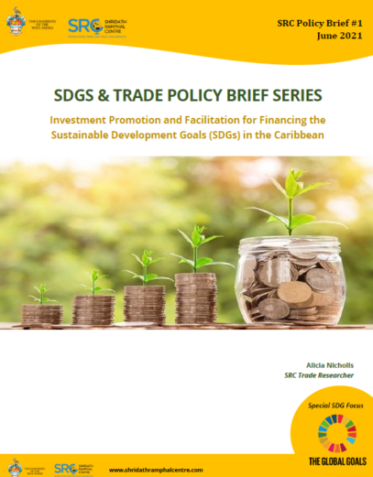Stakeholder Engagement Study Focus Group Discussions Report
By Rosemarie Cadogan
March 2025
The Caribbean Shipping Lanes Project (CSL) of the Shridath Ramphal Centre (SRC) of The University of the West Indies, in partnership with the United Nations Foundation and The Belize Port Authority, is providing technical support to Caribbean countries in the ongoing negotiations at the International Maritime Organisation (IMO) on the mid- term measures to implement the 2023 IMO Strategy on Reduction of GHG Emissions from Ships (the GHG Strategy). The CSL commissioned a series of focus group or
stakeholder engagement sessions aimed at gathering qualitative data regarding the potential impact of the mid-term measures on the import and export of essential goods, food security, livelihoods, port infrastructure and climate change mitigation and adaptation measures. The GHG Strategy enhances IMO’s contribution to global decarbonization efforts by addressing GHG emissions from international shipping. This includes identifying actions to be implemented by the international shipping sector as appropriate, while addressing its impacts on States and recognizing the critical role of international shipping in supporting the continued development of global trade and maritime transport services.
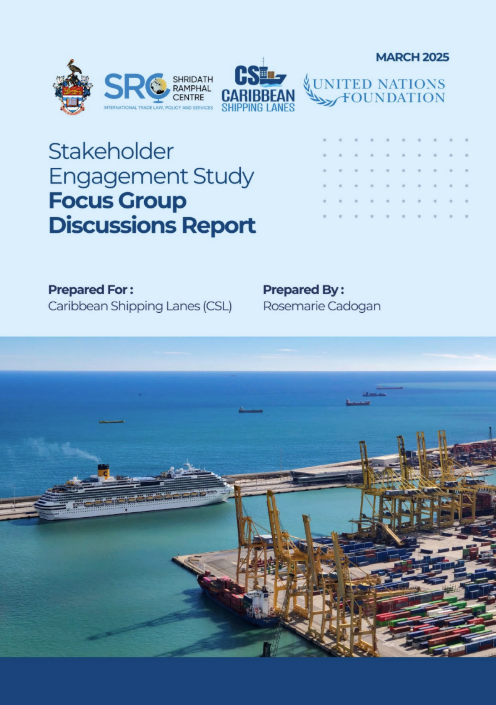
Legal Guide for the Caribbean on the IMO Greenhouse Gas (GHG) Strategy
By Prof. David Berry
March 2025
The current document is intended as a concise legal brief summarising the current legal context of the IMO GHG reduction measures, including advice for Caribbean negotiators on key legal considerations and strategies for engagement. The brief undertakes the above in the main body of the paper, and attaches Appendixes for supplementary material.
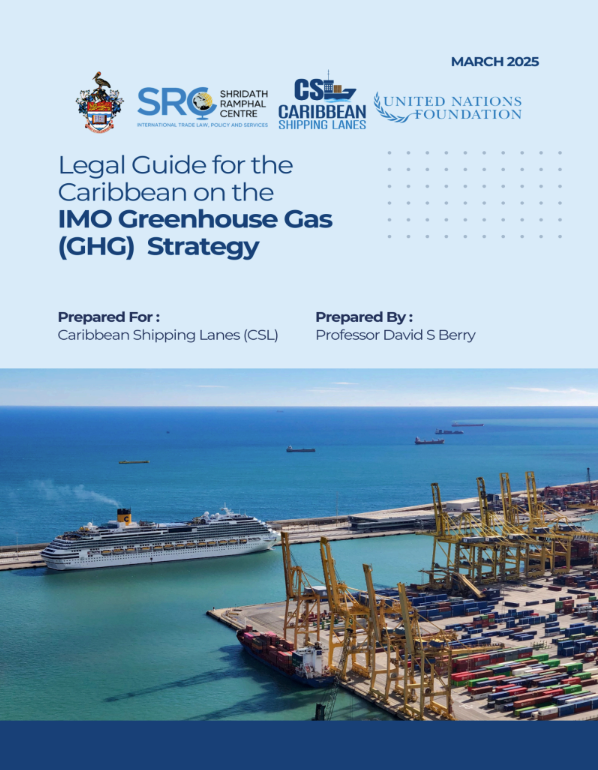
Scoping Paper for the Caribbean Region Assessing the Technical Elements of the IMO GHG Strategy
By Kenesjay Green Limited
March 2025
The International Maritime Organization’s (IMO) 2023 Revised GHG Reduction Strategy presents both significant challenges and opportunities for the Caribbean region. The strategy aims to reduce greenhouse gas emissions from shipping, which could lead to increased shipping costs but also encourage economic diversification and growth. The Caribbean plays a pivotal role in the global maritime industry primarily due to its strategic location. Apart from its proximity to important shipping lanes, the region plays a role in the energy supply chain for liquid fuels with its well-developed storage infrastructure. While not a major consumer of fuel itself, a high amount of fuel trading activity occurs in the region as it serves as a critical logistical hub that connects fossil fuel production in the United States with larger demand centers in Europe and South America.
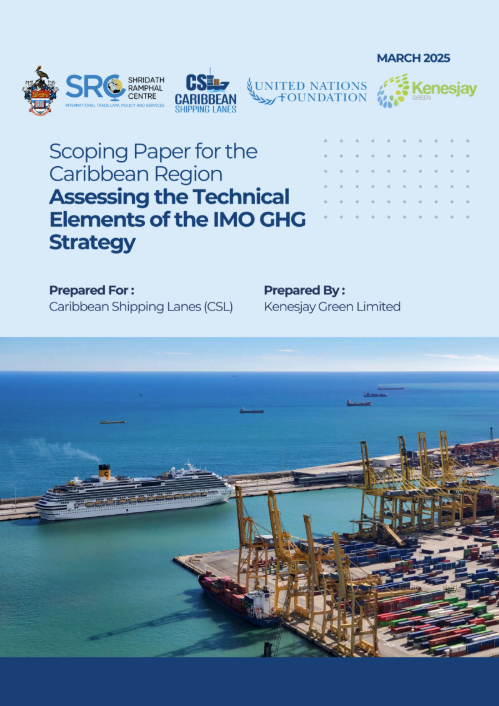
Compilation of Economic Reports Assessing the Impacts of Mid-Term Measures on Caribbean States
By SRC and Caribbean Shipping Lanes
March 2025
The objective of this Economic and Trade Data Validation report is to validate existing public domain data on trade volumes, values, and transport costs for the Caribbean region, including cross-checking with in-region data from ports and governments and evaluating the reliability of these datasets in IMO-specific analyses such as the Comprehensive Impact Assessment (CIA). The analysis will focus on the Caribbean states of Jamaica, Trinidad and Tobago, Antigua and Barbuda, Barbados, and Saint
Lucia. Generally, datasets concerning trade volume are found to be broadly consistent for the Caribbean countries considered in this analysis; however substantial deviations are observed across datasets representing transport costs. Based on these findings, care should be taken when interpreting CIA results for the Caribbean region. The data quality is sufficient to understand the relative impacts across various policy options.
A Multidisciplinary Examination of Caribbean Interests In Maritime Decarbonisation
By SRC and Caribbean Shipping Lanes
March 2025
This Introduction presents a series of reports commissioned by the Caribbean Shipping Lanes (CSL) Project, aimed at providing critical insights and analyses on the implications of the 2023 IMO Strategy on the Reduction of Greenhouse Gas (GHG) Emissions from Ships for the Caribbean region. That Strategy—which was adopted by the International Maritime Organization (IMO) in July 2023—commits member states to achieving net-zero GHG emissions from international shipping close to 2050, with indicative checkpoints of a 20–30% reduction by 2030 and 70–80% by 2040, compared to 2008 levels. Central to achieving these targets is the adoption of a “basket of midterm measures,” which includes both technical elements (such as mandatory use of low- and zero-carbon fuels and performance standards) and economic elements (such as market-based measures or a global GHG levy).
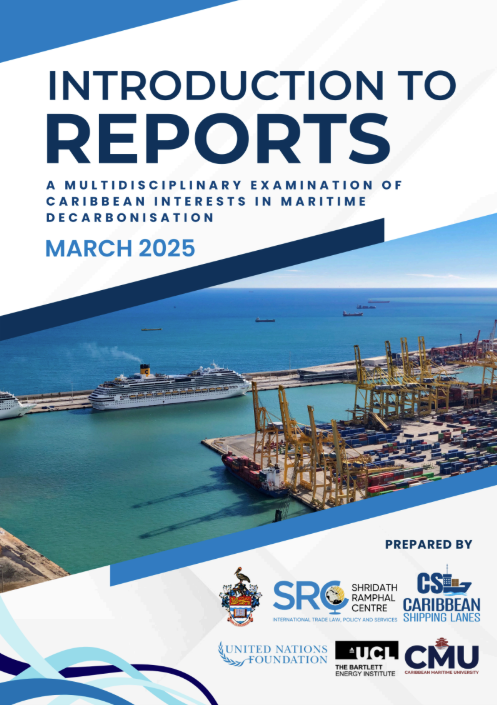
A Sustainable and Inclusive Trade Agenda for CARICOM
By Jan Yves Remy and Peta-Gaye Facey Wilson prepared with TESS
December 2024
International trade is often championed as a powerful engine of economic growth, with the potential to elevate living standards worldwide. The World Trade Organization (WTO), which stands at the forefront of global trade rules, negotiations, and dispute resolution, encapsulates this vision in its preamble, urging its members to engage in trade relations “with a view to raising standards of living, ensuring full employment and a large and steadily growing volume of real income and effective demand, and expanding the production of and trade in goods and services, while allowing for the optimal use of the world’s resources in accordance with the objective of sustainable development.”
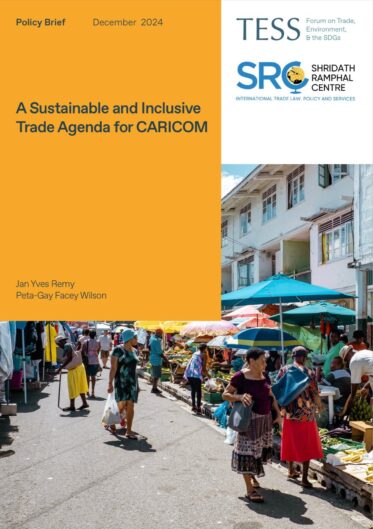
Caribbean Participation in IMO GHG Emissions Negotiations for Mid-Term Measures
By SRC
October 2024
The Caribbean region is at a critical juncture in ongoing negotiations at the International Maritime Organization (IMO) on binding mid-term measures to reduce greenhouse gas (GHG) emissions from shipping. These negotiations are being conducted pursuant to the IMO’s 2023 Strategy on Reduction of GHG Emissions from Ships, and will result in agreement on a technical measure and an economic measure. Once adopted by the IMO in 2025 and upon entering into force in 2027, these measures will have significant economic implications for Small Island Developing States (SIDS) like those in the Caribbean, which are highly dependent on maritime shipping for access to the global economy, trade, and employment in shipping and related sectors.
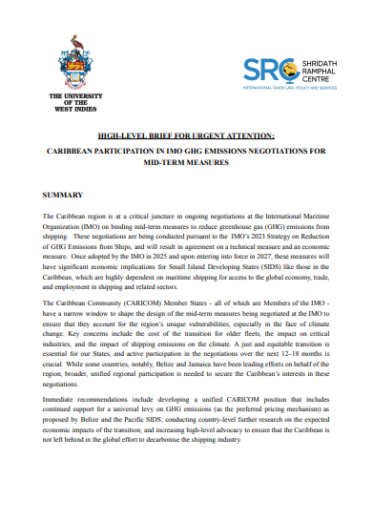
Transition to a Circular Economy: Examples from Africa and the Caribbean
By Chibole Wakoli
August 2023
Transitioning to a circular economy can contribute to addressing climate change, biodiversity loss, land degradation and the impact of water stress, and pollution. Africa and the Caribbean, being two of the world’s regions that are most vulnerable to the negative effects of climate change, stand to benefit from adopting circular economy principles. This economic model also has the potential to create new jobs in these two regions. However, the formal adoption of circular economy approaches in the African and Caribbean contexts is still lacking. This policy brief makes the case for a transition by African and Caribbean countries to a circular economy and the role that international trade may play in this regard. The brief also offers examples of initiatives taking place in both regions that illustrate the ambition to transition to a circular economy. At the same time, the brief highlights that significant barriers remain for Africa and the Caribbean, impeding their transition to a circular economy.
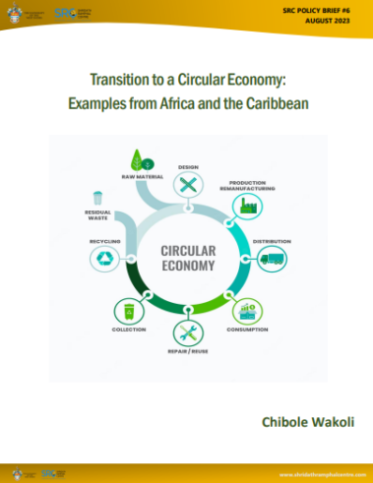
Caribbean and African SIDS’ International Investment Agreements and Climate Action
By Alicia Nicholls
June 2023
Scholarly and policy discourse about the negative impact of investment treaty-based litigation on governments’ sovereign climate adaptation and mitigation efforts has intensified in recent years. It is part of a wider on-going international investment law reform conversation which recognises that this regime is heavily skewed towards the protection of foreign investors even where a host State’s development interests might be harmed. There is, therefore, the need to ensure that treaty-based investor protections do not constrain host States’ ability to regulate in the public interest, particularly in environmental, public health and human rights matters.
Unlike other international law regimes, the international investment law regime principally comprises the network of international investment agreements (IIAs) countries have negotiated among themselves since the
1950s and increasing in the 1980s-2000s.
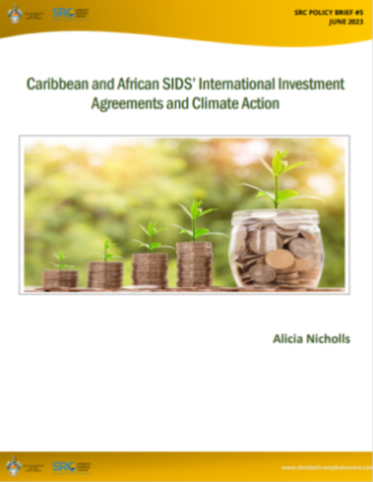
An Overview of the Trading Arrangements Between the United States and Africa and the United States and the Caribbean Community
By Chibole Wakoli and Jan Yves Remy
March 2023
The year 2022 was an important one for the United States’ engagement with the regions of Africa and the Caribbean: in June, the Biden Administration met with leaders of the Caribbean Community (CARICOM)1 separately and as part of the Summit of the Americas held in Los Angeles; in December, the Biden Administration invited leaders of African States to a series of meetings in Washington D.C. to discuss, among other things, the renewal of the trading relations under the African Growth and Opportunity Act (AGOA).
It is against this background that this SRC Policy Brief seeks to initiate a discussion about the trading arrangements that define the United States’ engagement with Africa and with CARICOM, with a view to identifying what lessons might usefully be drawn across those different configurations of relationships.
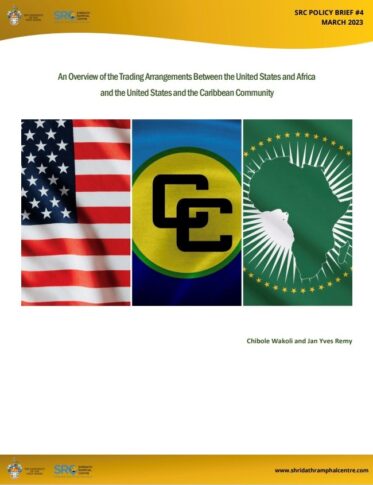
Trade-Related Climate Priorities for CARICOM at the World Trade Organization
By Dr. Jan Yves Remy prepared with TESS
January 2023
The Caribbean region throws up unique challenges for both the climate change and trade communities. Being among the most vulnerable regions in the world to the impacts of rising global temperatures, the small island developing states (SIDS) of the Caribbean Community (CARICOM) stand to face severe environmental, economic, and infrastructural losses in the coming years. On the trade front, the region still accounts for a very small share of global trade, has registered overall declines in terms of global competitiveness and participation in global value chains, and is a relatively small player in negotiating and dispute settlement fora at the World Trade Organization (WTO).
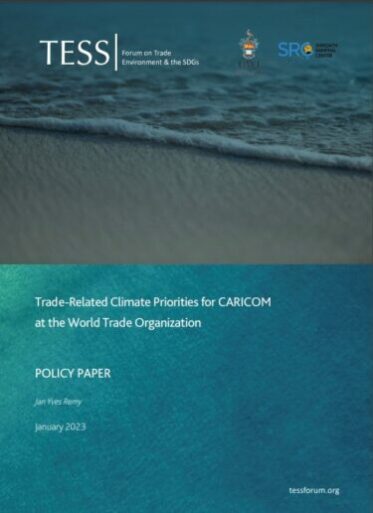
The Trade and Climate Change Interface
By Dr. Jan Yves Remy, Rueanna Haynes and Kaycia Ellis-Bourne
November 2021
The phenomenon of “climate change” is linked to direct or indirect human activity which alters the composition of the global atmosphere over and above natural climate variability observed over comparable time periods. It results from a gradual increase in average global temperatures caused by the accumulation of greenhouse gases (GHG) in the atmosphere. The principal GHGs are carbon dioxide (CO2), methane, nitrous oxide, and fluorinated gases. CO2 comprises 64.3% of GHGs and enters the atmosphere through the burning of fossil fuels, solid waste, trees and wood products, and certain chemical reactions. The adverse impacts of global warming and the resulting changes in the climatic conditions are formidable stumbling blocks to sustainable development, in particular, for small island developing states (SIDS) of which most Caribbean states are a sub-set.
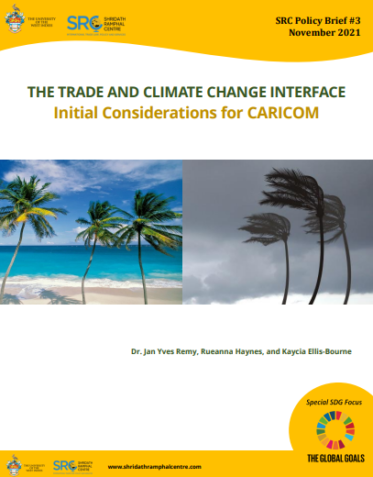
An Overview of Food Security and Trade Across CARICOM
By Chelcee Brathwaite
July 2021
Food security is a global challenge. Some like FAO (2016) and Breene (2016) believe that a 60% increase in global agricultural production (and nearly double in developing countries) will be required to feed a 9 billion-plus world population by 2050. Others like Mandyck and Schultz (2015) postulate that existing production can feed the world’s growing population, but food waste and unequal distribution obstruct this reality. However, more than simply feeding people, food security is a broad concept. Across the Caribbean Community (CARICOM), major challenges still hinder progress under the United Nations Sustainable Development Goal (SDG) – Zero Hunger (Sachs et al. 2020). Failure to reach these targets has wider socioeconomic implications which negatively impacts the achievement of other SDGs, further underscoring the importance of improving and achieving food security.
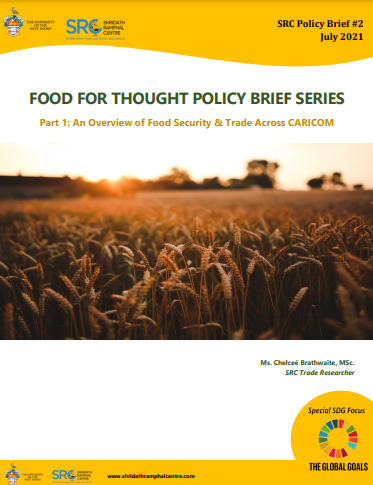
Investment Promotion and Facilitation for Financing Achievement of the SDGs in the Caribbean
By Alicia Nicholls
June 2021
What are the SDGs?
The SDGs comprise 17 goals and their 169 targets announced as the outcome of the UN summit for the adoption of the post-2015 development agenda in a resolution by the General Assembly on September 25, 2015. They build on the eight Millennium Development Goals (MDGs), but, unlike the MDGs which focused on developing countries, the SDGs are universal – applying to all countries. The SDGs are not just integrated, but indivisible. They comprise and balance the three pillars of sustainable development which are: economic, social and environmental (UN 2015a).
